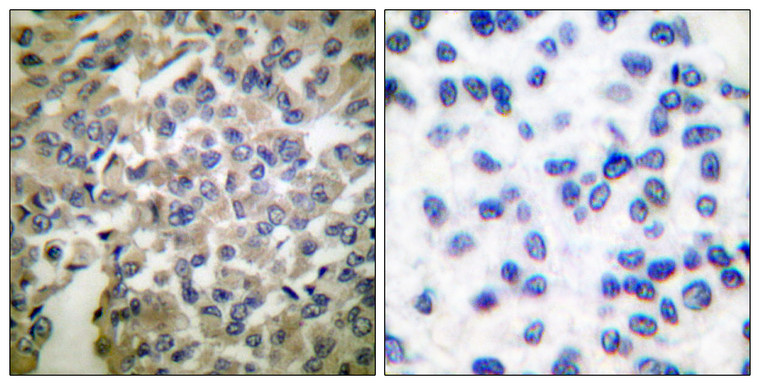| Host: |
Rabbit |
| Applications: |
WB/IHC/IF/ELISA |
| Reactivity: |
Human/Mouse/Rat |
| Note: |
STRICTLY FOR FURTHER SCIENTIFIC RESEARCH USE ONLY (RUO). MUST NOT TO BE USED IN DIAGNOSTIC OR THERAPEUTIC APPLICATIONS. |
| Short Description: |
Rabbit polyclonal antibody anti-Synaptotagmin-1 and Synaptotagmin-2 (276-325 aa) is suitable for use in Western Blot, Immunohistochemistry, Immunofluorescence and ELISA research applications. |
| Clonality: |
Polyclonal |
| Conjugation: |
Unconjugated |
| Isotype: |
IgG |
| Formulation: |
Liquid in PBS containing 50% Glycerol, 0.5% BSA and 0.02% Sodium Azide. |
| Purification: |
The antibody was affinity-purified from rabbit antiserum by affinity-chromatography using epitope-specific immunogen. |
| Concentration: |
1 mg/mL |
| Dilution Range: |
WB 1:500-1:2000IHC 1:100-1:300ELISA 1:20000IF 1:50-200 |
| Storage Instruction: |
Store at-20°C for up to 1 year from the date of receipt, and avoid repeat freeze-thaw cycles. |
| Gene Symbol: |
SYT1SYT2 |
| Gene ID: |
6857127833 |
| Uniprot ID: |
SYT1_HUMANSYT2_HUMAN |
| Immunogen Region: |
276-325 aa |
| Specificity: |
Synaptotagmin Polyclonal Antibody detects endogenous levels of Synaptotagmin protein. |
| Immunogen: |
The antiserum was produced against synthesized peptide derived from the human Synaptotagmin at the amino acid range 276-325 |
| Post Translational Modifications | Glycosylated. |
| Function | Calcium sensor that participates in triggering neurotransmitter release at the synapse. May have a regulatory role in the membrane interactions during trafficking of synaptic vesicles at the active zone of the synapse. It binds acidic phospholipids with a specificity that requires the presence of both an acidic head group and a diacyl backbone. A Ca(2+)-dependent interaction between synaptotagmin and putative receptors for activated protein kinase C has also been reported. It can bind to at least three additional proteins in a Ca(2+)-independent manner.these are neurexins, syntaxin and AP2. Plays a role in dendrite formation by melanocytes. |
| Protein Name | Synaptotagmin-1Synaptotagmin ISytiP65 |
| Database Links | Reactome: R-HSA-181429Reactome: R-HSA-181430Reactome: R-HSA-210500Reactome: R-HSA-212676Reactome: R-HSA-264642Reactome: R-HSA-5250958Reactome: R-HSA-5250989Reactome: R-HSA-6794361Reactome: R-HSA-8856825Reactome: R-HSA-8856828Reactome: R-HSA-888590 |
| Cellular Localisation | Cytoplasmic VesicleSecretory Vesicle MembraneSingle-Pass Membrane ProteinSecretory VesicleSynaptic Vesicle MembraneChromaffin Granule MembraneCytoplasm |
| Alternative Antibody Names | Anti-Synaptotagmin-1 antibodyAnti-Synaptotagmin I antibodyAnti-Syti antibodyAnti-P65 antibodyAnti-SYT1 antibodyAnti-SVP65 antibodyAnti-SYT antibody |
Information sourced from Uniprot.org
12 months for antibodies. 6 months for ELISA Kits. Please see website T&Cs for further guidance









